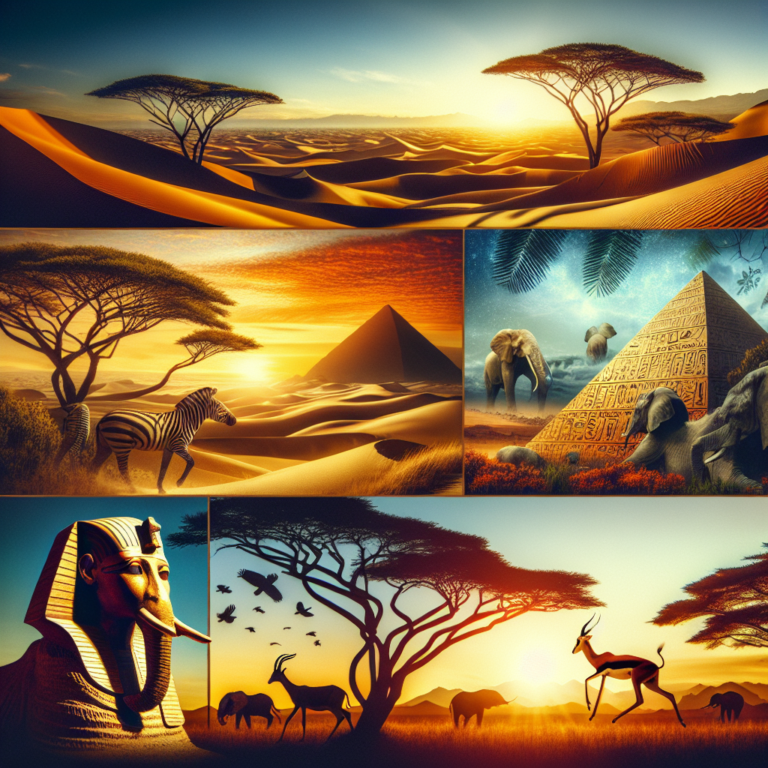
Africa, a land of immense diversity and rich history, is often shrouded in both fascination and misconceptions. From the vast, arid expanses of the Sahara Desert to the cradle of ancient civilizations along the Nile, this continent offers a tapestry of natural and cultural wonders. In this blog, we will embark on an enlightening journey through Africa’s enchanting landscapes and vibrant societies. We’ll explore Egypt’s lasting legacy of pharaohs and pyramids, uncover the secrets of the Sahara’s resilient inhabitants, and delve into Kenya’s thriving ecosystems where lions and giraffes roam. Yet, it’s not all beauty; we’ll also confront the harsh realities of poverty and environmental challenges faced by millions. Join us as we unravel the mysteries, celebrate the triumphs, and understand the ongoing struggles of this captivating continent.
The Sahara: A Desert of Extremes
Africa is the third largest continent in the world, following Asia and America, and is divided into 54 countries and home to over 1,500 languages. Such linguistic diversity is a testament to the rich cultures and histories that span this vast land.
The Sahara Desert is the largest desert on the planet, stretching across much of North Africa. It’s a place of both wonder and harsh realities. This immense desert is characterized by endless sand dunes and sparse vegetation, yet it supports life in surprising ways.
- Survival in the Sahara: The indigenous peoples, known as Tuaregs, have adapted remarkably to this extreme environment. They rely on camels, often referred to as the “ships of the desert,” to navigate the vast dunes in search of water and sustenance.
- Desert Divides: The Sahara also serves as a natural barrier, dividing Africa into two distinct regions: the Arab countries to the north and Sub-Saharan Africa to the south.
Egypt: A Cradle of Civilization
In the northeastern corner of Africa lies Egypt, a country synonymous with ancient history and monumental achievements.
- Pyramids and Pharaohs: The civilization of ancient Egypt began over 5,000 years ago and endured for nearly 3,000 years. Pharaohs like Tutankhamun left behind awe-inspiring relics, including the iconic pyramids, which served as their tombs. These pyramids are not merely structures but intricate labyrinths with hidden chambers and passageways.
- The River Nile: The Nile, the longest river in Africa, was central to the life and survival of ancient Egyptians. The river provided water for drinking, agriculture, and transportation, fostering the growth of cities and societies along its banks.
- Innovations and Deities: Ancient Egyptians were pioneers in various fields. They invented combs, scissors, and makeup, and their medical practices were advanced for their time. They also worshipped a pantheon of gods, with Ra, the sun god, being the most important. The belief in an afterlife was strong, leading to the practice of mummification to preserve bodies for eternity.
Kenya: A Sanctuary of Wildlife
Moving to East Africa, Kenya is renowned for its vast savannas and diverse wildlife.
- Capital City with a Sanctuary: Nairobi, Kenya’s capital, is unique for having a wildlife sanctuary within its urban bounds. This sanctuary provides a haven for animals like lions, giraffes, and rhinos, amidst the bustling city life.
- Mount Kilimanjaro: Although located in neighboring Tanzania, Mount Kilimanjaro, Africa’s highest peak, is often associated with Kenya. This three-peak volcano is capped with snow, an astonishing sight given its tropical location.
The Harsh Realities
While Africa’s beauty and history are compelling, the continent also faces severe challenges.
- Poverty: Africa is home to the ten poorest countries in the world. The scarcity of water, due to inadequate rainfall and rivers, makes agriculture and daily life incredibly difficult in many regions. Countries like Somalia and Nigeria struggle with food shortages, lack of education, and inadequate healthcare.
- Environmental Challenges: Another pressing issue is the illegal dumping of waste by foreign nations, turning parts of Africa into dangerous garbage dumps. This not only harms the environment but also endangers the health of its people.
Efforts to Make a Difference
Despite these challenges, efforts are underway to improve the quality of life across the continent.
- Global Solidarity: Many organizations and individuals are working tirelessly to provide aid, education, and sustainable solutions to African communities. These efforts aim to ensure that children can attend school, receive proper healthcare, and have access to clean water.
- Personal Responsibility: Everyone can contribute to these efforts by being mindful of their environmental impact and supporting initiatives aimed at helping those in need.
Understanding Ancient Egypt
Egypt is a country with a history that continues to captivate the world.
- Origins of Civilization: Ancient Egypt’s civilization was founded around 3200 BC by Pharaoh Narmer, also known as the Scorpion King. This civilization thrived along the Nile, with the river’s fertile banks supporting agriculture and settlement.
- Religious Beliefs: Egyptians worshipped a multitude of gods, often depicted with human bodies and animal heads. The most revered was Ra, the sun god. Their belief in an afterlife led to elaborate burial practices, including mummification and the construction of tombs filled with goods for use in the next world.
- Hieroglyphics: The written language of hieroglyphics was a complex system of symbols and images. For centuries, their meaning remained a mystery until archaeologists deciphered them, revealing much about ancient Egyptian life and beliefs.
The Children of Africa
Africa’s future lies in the hands of its youth. Ensuring that children have access to education, healthcare, and a safe environment is crucial for the continent’s development.
- Education and Healthcare: Efforts to build schools and hospitals are essential in providing a foundation for a brighter future.
- Empowerment: By empowering children with knowledge and resources, we can help break the cycle of poverty and create opportunities for growth and prosperity.
Africa is a continent of contrasts, where ancient and modern worlds converge, and where beauty and hardship coexist. By learning more about its wonders and challenges, we can contribute to its journey towards a better future for all its inhabitants.